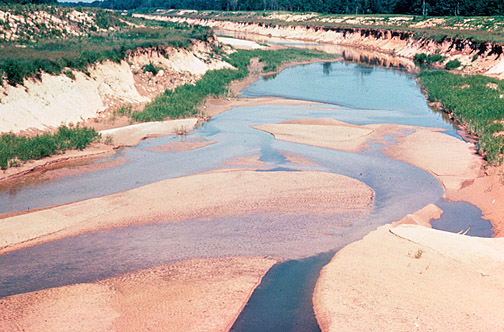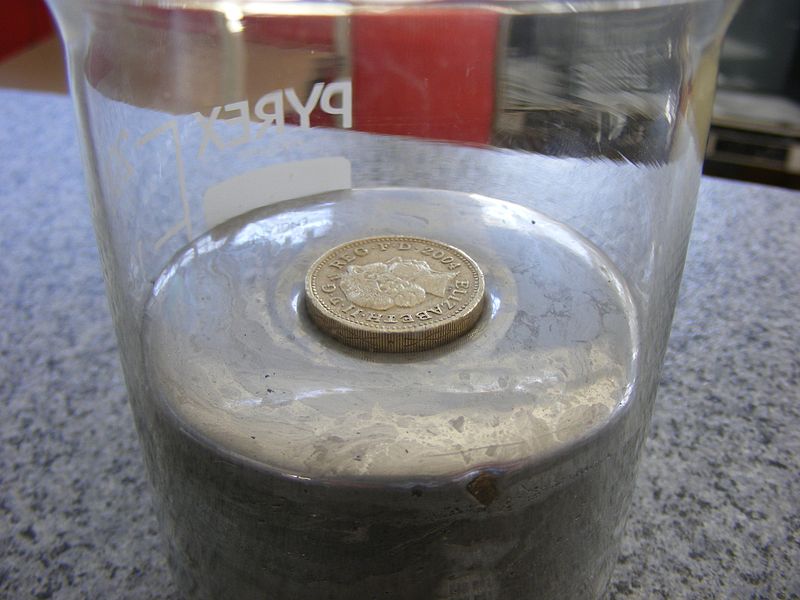The key difference between sedimentation and flotation is that sedimentation involves the settlement of residue at the bottom of the container, whereas flotation describes the relative buoyancy of objects.
Sedimentation is the process of settling or being deposited as sediment. Flotation is the action of floating in a liquid or a gas. Therefore, sedimentation and flotation are completely different phenomena that describe opposing definitions.
CONTENTS
1. Overview and Key Difference
2. What is Sedimentation
3. What is Flotation
4. Sedimentation vs Flotation in Tabular Form
5. Summary – Sedimentation vs Flotation
What is Sedimentation?
Sedimentation is the process of settling or being deposited as sediment. We can describe it as the tendency of particles in a suspension to settle out of the fluid. This occurs due to the response that these particles have against their motion through the fluid.

Figure 01: Formation of Sediments
The force that is acting on these particles can be gravity, centrifugal acceleration, or electromagnetism. When the heavier particles settle on the bottom of the fluid, we can pour off the liquid above the sediment, separating the sediment from the fluid.
In chemical applications, sedimentation is important in measuring the size of large molecules having the force of gravity augmented with centrifugal force in an ultracentrifuge.
What is Flotation?
Flotation is the action of floating in a liquid or a gas. Flotation occurs as a result of buoyancy or upthrust. It is an upward force exerted by a fluid that is opposite to the weight of an object that is fully or partially immersed in the fluid. Therefore, we can define flotation as a phenomenon that is related to the relative buoyancy of the objects.
Flotation is very important in the selective separation of solid particles, liquid droplets, chemicals, ions, or biological entities from a bulk liquid, depending on their surface properties. For example, in liquid-solid separation technology, flotation is useful to separate solids in suspension that are recovered by their bond to gas bubbles. This technique is important in removing particles in size range of 10 to 200 micrometers effectively.

Figure 02: A Metallic Coin Floating on Mercury
Moreover, when an object displaces a weight of water that is equal to the weight of that object, the object tends to float. This is the principle of flotation. It can be described as a floating object that displaces a weight of the fluid that equals the own weight of the object.
What is the Difference Between Sedimentation and Flotation?
Sedimentation is the process of settling or being deposited as sediment. Flotation is the action of floating in a liquid or a gas. The key difference between sedimentation and flotation is that sedimentation involves the settlement of residue at the bottom of the container, whereas flotation describes the relative buoyancy of objects. The formation of sediment at the bottom of a lake is an example of sedimentation, while the flotation of dry leaves on the river water surface is an example of flotation.
Below is a summary of the difference between sedimentation and flotation in tabular form for side by side comparison.
Summary – Sedimentation vs Flotation
Sedimentation and flotation are completely different phenomena that describe opposing definitions. The key difference between sedimentation and flotation is that sedimentation involves the settlement of residue at the bottom of the container, whereas flotation describes the relative buoyancy of objects.
Reference:
1. “Flotation.” An Overview | ScienceDirect Topics.
Image Courtesy:
1. “Siltation or Sedimentation” By U.S. Fish and Wildlife Service – from the National Digital Library of the United States Fish and Wildlife Service (Public Domain) via Commons Wikimedia
2. “Pound-coin-floating-in-mercury” By Alby (talk) – Moved from English Wikipedia, “I (Alby (talk)) created this work entirely by myself” (CC BY-SA 3.0) via Commons Wikimedia
ncG1vNJzZmivp6x7pbXFn5yrnZ6YsqOx07CcnqZemLyue9ahmK1lmah6tbTEZpuinpaav6a6wp5km52krLKmuoysnJ2hnZq7ta3ToqanZZGjsW6yy6irmqyZpLtw